

Energy Funders
The Energy Funders oil and gas investment platform offers the opportunities of investing in oil and gas investment companies through crowdfunding.
What Does a Landman Do - Oil and Gas Land Management. Landman refers to a role in oil and gas with responsibilities including researching property titles, maintaining leases and auditing.
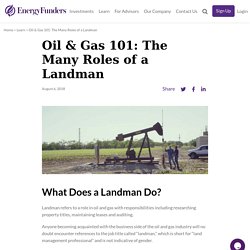
Anyone becoming acquainted with the business side of the oil and gas industry will no doubt encounter references to the job title called “landman,” which is short for “land management professional” and is not indicative of gender. There are many landman responsibilities across the spectrum of domestic oil and gas production in the United States. Researching Property Ownership and Titles. Why Do We Get Access to the Best Oil and Gas Investments?
Oil and gas operators constantly need capital for growth.
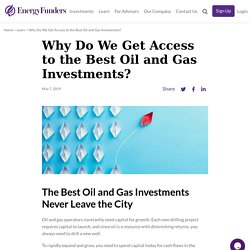
Each new drilling project requires capital to launch, and since oil is a resource with diminishing returns, you always need to drill a new well. To rapidly expand and grow, you need to spend capital today for cash flows in the future. However, limitations saddle the traditional ways of raising funds. Operators can get funding from bank loans but then they’ve taken on debt.They can go public with their company, but that comes with its own set of requirements – and means that they lose control of their companies.They can get private equity but then the private equity firm owns the firm and dictates its interests. Recently, EnergyFunders’ technical team attended the Hart 2019 Energy Capital Conference in Dallas, Texas, where experts confirmed that operators need another source of capital. How to Recognize (and Avoid) Speculative Oil Investments. While every investment comes with inherent risk, oil investments are an especially risky business – albeit one with potentially outsized returns.
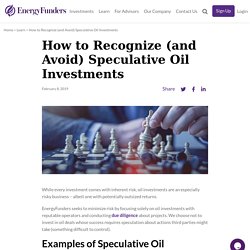
EnergyFunders seeks to minimize risk by focusing solely on oil investments with reputable operators and conducting due diligence about projects. We choose not to invest in oil deals whose success requires speculation about actions third parties might take (something difficult to control). Examples of Speculative Oil Investments Mineral Acquisition Projects Large-scale mineral acquisition projects are deals in which speculators seek investors to help finance the purchase of minerals from as many people in an area as possible. These deals are highly speculative because they require a large-scale leasing effort, plus expensive due diligence of minerals purchased.
Secondly, most mineral owners don’t sell interest in their minerals. Crude Oil Investing - 11 Major League Mistakes to Avoid. Investing in crude oil is hard enough without making rookie mistakes.
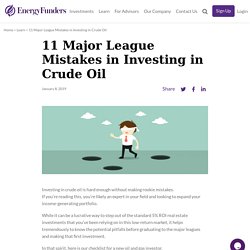
If you’re reading this, you’re likely an expert in your field and looking to expand your income-generating portfolio. While it can be a lucrative way to step out of the standard 5% ROI real estate investments that you’ve been relying on in this low-return market, it helps tremendously to know the potential pitfalls before graduating to the major leagues and making that first investment. In that spirit, here is our checklist for a new oil and gas investor. Get reading, rookie. 1. The biggest reason investing in crude oil is loaded with pitfalls is because of the abundance of bad deals floating around in the market. Deep Hole Drilling - Why Invest in Deep Hole Drilling? Why Invest in Drilling Deep Hole Wells?
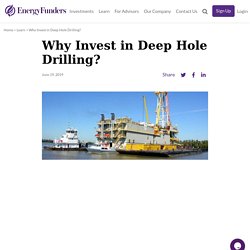
Why exactly is EnergyFunders investing in drilling deep oil and gas wells? We’ve found that through investing in ultra-deep wells, you can find a risk to reward that is unparalleled in investing. After you account for the tax benefits that dramatically reduce your risked capital dollars with the ability to diversify your capital into small bets across more projects, it only takes a few big discovery winners to make us for any dry holes or moderate producers. Deep wells require more capital and thus reduce the number of operators that can afford to play in the space. It also means that more caution and due diligence goes into these wells.
How to Invest in Oil and Gas - 401k Alternative Investment. With EnergyFunders, you have more ways to invest in oil and gas than ever.
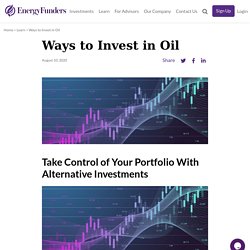
We’ve partnered with Rocket Dollar so you can invest in oil and gas with a self-directed IRA or solo 401K. Rocket Dollar allows you to create an online retirement account in minutes and start creating an alternative investments portfolio in the asset classes you select. This allows you to invest your way while still enjoying the tax benefits of a retirement account. A self-directed IRA allows you to take ownership of your investments. You select when, where and how much you want to invest, without a custodian, which speeds up the investment process. For individuals with self-employment income, the self-directed solo 401K is a convenient option to take control of your retirement investing. What Is Equity Crowdfunding - Why Use It For Oil Investing? Crowdfunding in a nutshell is the financing of projects by a large group of people, each of whom individually couldn’t or wouldn’t finance the entire project.
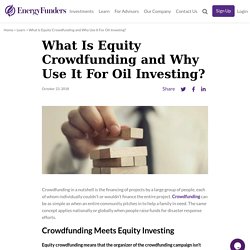
Crowdfunding can be as simple as when an entire community pitches in to help a family in need. The same concept applies nationally or globally when people raise funds for disaster response efforts. Investing in Oil and Gas: Treasure Hunting For Investor. Step 1: Survey While it’s hard to imagine sitting here in my cubicle in Houston, there are thousands of feet of Earth directly below my feet.
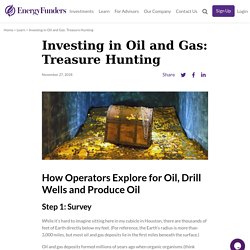
(For reference, the Earth’s radius is more than 3,000 miles, but most oil and gas deposits lie in the first miles beneath the surface.) Oil and gas deposits formed millions of years ago when organic organisms (think plankton-like) died and accumulated, thousands of feet beneath you. Where to Invest in Oil - How to Invest in Oil Drilling? When learning how to invest in oil drilling, one thing to look at is the current price of oil and specifically, the price per barrel you need to break even.
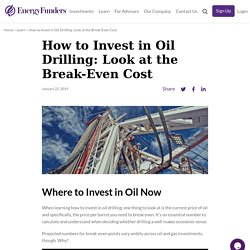
It’s an essential number to calculate and understand when deciding whether drilling a well makes economic sense. Investing in Natural Gas - What is a Price for a Well? Most people pay attention to the price of crude oil – whether they’re consumers filling up at the tank or oil investors looking at potential returns.
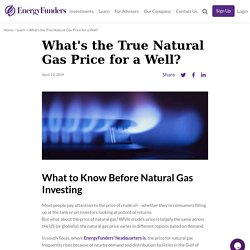
But what about the price of natural gas? While crude’s price is largely the same across the US (or globally), the natural gas price varies in different regions based on demand. In south Texas, where EnergyFunders’ headquarters is, the price for natural gas frequently rises because of nearby demand and distribution facilities in the Gulf of Mexico. That’s one reason we often drill in Texas and Louisiana – higher natural gas prices there provide us, and our investors, increased profit margins. Investing in Oil Wells - Conventional vs. Unconventional. One of the big myths of investing in oil wells is that you need scale to compete.
While that’s true for the large projects that require significant development capital, you can also find pockets of opportunity in small-scale drilling projects. In many cases, the big money can’t or won’t pursue these projects because it won’t move the needle for their organization. That opens up a window of opportunity where the small investors enjoys a structural advantage over their larger peers. To understand why, let’s first review the brief history of conventional (i.e. vertical) versus unconventional (i.e. horizontal) drilling in the U.S. Horizontal drilling and fracking techniques have been around for decades, but they were mostly uneconomical until the last 15 years. Then, everything changed with the improvement of shale drilling technology in the mid-to-late 2000’s. However, conventional deposits never disappeared completely. Oil Well Investment - How to Buy and Invest in an Oil Wells. Energy is lucrative. But anyone can claim to have oil and gas interests for sale.
It takes industry savvy to separate the true oil men from the legions of oil patch phonies. When considering an oil well investment, it’s essential to have a good process to weed out crooks, the inexperienced and the promoters. 1.) Bet on the Jockey, Not Just the Horse We have all heard it before, but it really does matter who you do business with. 2.) How to Evaluate Oil and Gas Investment Opportunities? Project location plays an important part in the investment decision-making process — It can make or break a project. These are a few of the criteria that we evaluate when vetting a potential oil well investment before presenting it to our investors. Legal Criteria for Oil and Gas Investment Opportunities State Regulatory Commission Rules Well placement must follow state rules. ROI Oil and Gas - Calculate ROI on Oil and Gas Investment. Return Potential …The reason for investing in the first place, right? The first step to understanding how to calculate ROI (return on investment) is to decide what kind of oil investing fits your criteria.
Are you looking for high risk/high reward exploration drilling projects or production buys with smaller but more defined returns? Understanding your risk tolerance, portfolio exposure, and what kind of returns you are looking for will help you select projects that fit your goals. Tax Benefits. A Simple Online Platform For Oil and Gas Investment. An accredited oil and gas investor can access multiple investments in one easy portal. Our platform allows smaller buy-ins in projects at various stages of drilling so you can diversify your portfolio in one place. We only partner with expert operators with proven track records. We carefully vet each potential oil investing project and present only the best to our members.
We give you all the information about the project, including third-party engineering reviews, disclosures and projected rates of return. We also provide information about tax benefits, risks and rewards so you can be an informed investor. NRI Oil and Gas - How to Calculate Net Revenue Interest. Crude Oil Investing - How to Buy Crude Oil Stock and Win. When the crude oil price falls, you might be tempted to run from crude oil investing. It’s understandable to sweat when others worry and the commodities market fluctuates. But, that could be a short-sighted mistake. Oil and Gas Investments Tax Deductions and Top Tax Benefits. You can legally deduct up to 80% of your investment in the year you make the investment—and up to 100% in just five years. Intangible Drilling Cost Deduction Intangible drilling costs are usually about 65-80% of the cost of a well. Intangible drilling costs are any costs that can’t be sold later, such as:
Oil and Gas Investment Opportunities - Oil Drilling Project. For many decades, there was only one way to drill a well – vertically. Now, with advanced drilling technology, operators can add steerable motors that enable “slant” or directional drilling. They can drill down vertically, build a curve, and drill at angles of 90 degrees or more in the horizontal direction. This is called horizontal drilling. Oil and Gas Investment Company - The EnergyFunder Platform. Invest in Oil With Little Money - Best Way To Invest in Oil. Unlike stocks in a company or mutual funds in a collection of companies, oil functions as a commodity with a price swinging up and down depending on demand for production.
However, unlike precious metals, which are priced based on a perceived value, oil is most often driven by consumption and steady supply to ensure that transportation and infrastructure continue. For example, if someone were to produce a nuclear battery that could power a car, the price of oil would probably drop to a fraction of what it is today because there would be no need for gasoline or diesel. On the other hand, gold would still be considered valuable and in high demand.